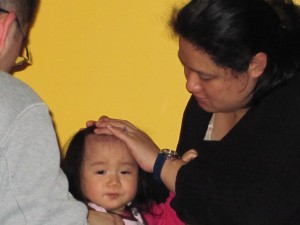The cost of reactivity to children
In past blogs I spoke about our Reactive and Creative Selves and our need to intercept the reactions and replace them with thoughtful responses. There is no place that this intervention is more important than when we are dealing with our children. Young children are greatly influenced by our verbal and non-verbal communication. From a very early age they are able to pick up our disapproval and are very frightened by it. This fear gets imprinted in their minds and often causes great havoc throughout their adult life.
 Because a child’s well-being is dependent on his parents, when the parent expresses displeasure or anger the child becomes fearful that the parent will now leave him – abandon him – which terrifies him. This fear of rejection or abandonment leads the child to modify his behavior, his opinion or his point of view, in order to avoid disapproval, not because he understands the error of his behavior.
Because a child’s well-being is dependent on his parents, when the parent expresses displeasure or anger the child becomes fearful that the parent will now leave him – abandon him – which terrifies him. This fear of rejection or abandonment leads the child to modify his behavior, his opinion or his point of view, in order to avoid disapproval, not because he understands the error of his behavior.
A young child’s psyche desperately needs approval. Disapproval unconsciously but viscerally activates his fight/flight or freeze response, triggered by his terror of being alone, which is connected to his survival mechanism. From very early on, our egos, our identities, the “I,” believe we have to be good, we have to please our parents so that we’re taken care of. If we don’t they may leave us, and if they leave us we will die.
This is not a conscious process; the child doesn’t sit there and think, “my parents are going to leave me now, I’m going to be all alone, I’m going to die” – it’s an emotional reaction of threat. It’s psychological threat, but the body doesn’t know it’s psychological threat: it perceives it as life-and-death threat.
Being good, looking good becomes directly linked to survival. Seeking approval now becomes one of the major driving forces in the individual’s life.
You may ask how on earth am I supposed to discipline my child and teach him the difference between right and wrong without expressing disapproval? Children need discipline and socialization, but from a caring and patient space. They don’t know better and they need to be guided and taught. The challenge here is to correct or teach the child without being reactive. Children don’t need to hear and feel our anger, our displeasure, when all they are doing is being children. They need our guidance and support as they make mistakes and learn through the consequences we set up for them.
---


3 Comments on “The cost of reactivity to children”
… and the children become reactive themselves when dealing with others themselves, right?
Is this where bullying comes from, for example? I mean, I don’t know — but it seems logical.
Another thing I wonder about, sometimes, is that some people who had reactive parents *do* seem to gain some understanding and are determined to NOT be like their parents in certain ways. I’m guessing these people found approval, perhaps, in school, in peer groups, etc.
It seems that in the Creative Self comes “promote self and humanity” Does promote self relate to
loving yourself? Does the adage” you can’t love anything, your child/humanity if you don’t love
yourself ” apply here? It almost sounds too easy.
Responding to Jeff’s remark that children learn to become reactive themselves, is absolutely the case. Children model what they see. If their parents are reactive and threatening, they become reactive and threatening. You can see this often with the way older siblings treat their younger ones. They mimic their parents perfectly.
And yes again, bulling goes along with what I just said about younger siblings. These same children will bully children in school or in the playground. It is learned behavior.
Yes, there are individuals who remember what it was like to experience fear and pain at home and are determined not to repeat their parents’ mistakes.
Responding to Barbara’s comment, unless a child experiences unconditional love, it is difficult for the adult to experience it toward self or others. To operate from the Creative Self, you need to be able to let go of the judgment and fear of the ego and embrace yourself exactly as you are. That comes from the Creative Self, that part of you that sees the whole and loves it all. It is actually difficult to embrace and love ourselves as we are because we have not had that modeled for us by our parents. While they loved us, it never felt unconditional. We have to find that love within us…in Sprit.